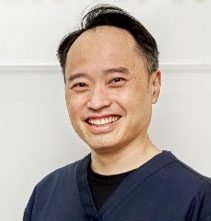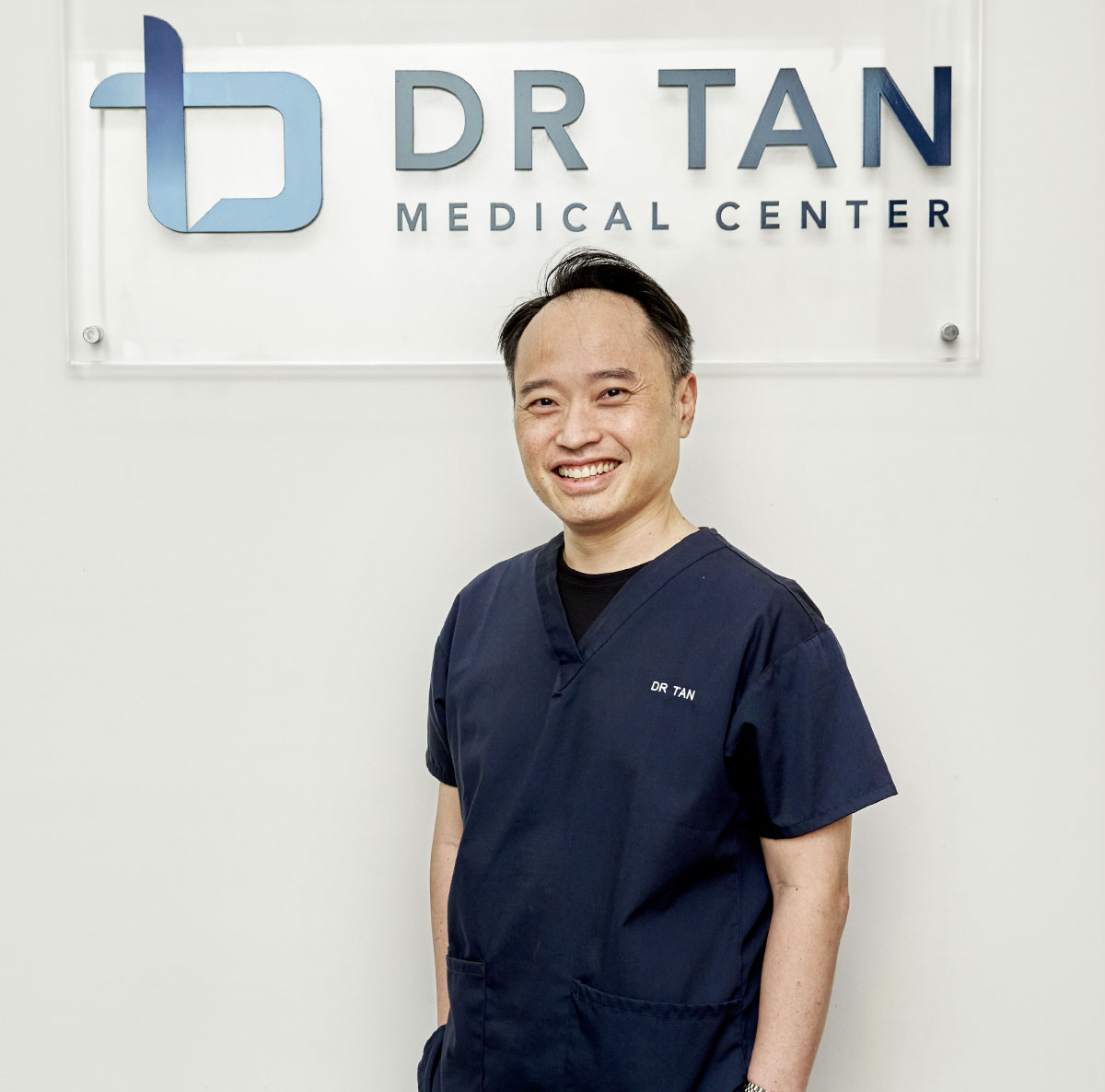HIV Treatment in Singapore

Dr Tan Kok Kuan
Men’s Health & Sexual Health Doctor
MBBS (S’pore), Cert. Men’s Health, Cert. Clinical Dermatology,Member, Academy for Men’s Health (Singapore)Member, Singapore Association for the Study of ObesityMember, International Society of Sexual Medicine
What Is HIV?
The human immunodeficiency virus (HIV) is a virus that damages the body’s immune system, rendering the body too weak to fight off infections and diseases effectively. Currently, there is no cure for HIV, but treatments such as antiretroviral therapy can alleviate symptoms and keep the virus under control, allowing patients to lead normal, healthier and longer lives. HIV screening in Singapore aims to catch the virus as early as possible and prevent it from developing into AIDS.
What Is the Relation Between HIV and AIDS?
If left untreated, HIV progresses into an advanced stage called acquired immunodeficiency syndrome (AIDS). It is the most advanced stage of HIV infection whereby the immune system is severely compromised. AIDS is a chronic and potentially life-threatening condition. However, a person can have HIV and not develop AIDS if they receive effective antiretroviral therapy. Timely HIV screening and treatment are key to preventing the development of AIDS.
How Common Is HIV in Singapore?
The prevalence of HIV in Singapore is relatively low compared to many countries. According to the MOH report, the annual number of new HIV cases among Singapore residents had ranged from 300 to 500 from 2009 to 2019, and gradually decreased in the past few years.
The majority of HIV cases in Singapore are male, and, concerningly, over half are diagnosed at a late stage of infection. Sexual intercourse is the main mode of transmission, with roughly half of all recorded cases attributed to homosexual transmission.
What Causes HIV?
HIV is caused by a virus that can be transmitted through contact with the bodily fluid of an infected individual, including blood, semen, vaginal fluids, anal mucus and breastmilk. Activities that can spread HIV include:
Having unprotected sexual intercourse with an HIV-positive individual
Sharing needles and syringes with an HIV-positive individual
Mother-to-infant transmission via pregnancy, childbirth and breastfeeding
Blood transfusions using blood from someone with HIV
HIV, however, is not transmitted through saliva, urine or sweat. You cannot get HIV by holding hands, sharing eating and drinking utensils, sharing toilet seats, from mosquitoes and other insects, and through the air or water.
How Do I Know If I Have HIV?
An HIV test is the only reliable way to determine your HIV status, as symptoms alone are not enough. Early diagnosis is vital for your health and for preventing transmission to others. Our clinic provides confidential HIV testing. Contact us to schedule your visit.
What Are the Potential Complications of HIV?
Untreated HIV can significantly weaken the immune system, making the body vulnerable to a range of serious and potentially life-threatening complications, including:
- HIV-Associated Dementia : In advanced stages, HIV can affect the brain, leading to HIV-associated dementia (also known as AIDS dementia complex), which impairs memory, concentration, and cognitive function.
- Cryptococcal Meningitis : A severe fungal infection of the brain and spinal cord, this condition can cause headaches, fever, and neurological symptoms, and may be fatal if not treated promptly.
- Pneumocystis Pneumonia (PCP) : A common opportunistic infection in people with advanced HIV, PCP causes inflammation and fluid buildup in the lungs, leading to severe breathing difficulties.
- Tuberculosis (TB) : HIV weakens the immune defences, increasing susceptibility to TB—a bacterial infection that primarily affects the lungs but can spread to other organs.
- Cytomegalovirus (CMV) Disease : This viral infection can damage multiple systems, including the brain, eyes, lungs, and digestive tract, leading to vision loss, cognitive decline, and respiratory complications.
- HIV-Associated Cancers : People living with HIV are at increased risk of certain cancers, such as Kaposi sarcoma, non-Hodgkin lymphoma, and cervical cancer, due to prolonged immune suppression.
What Are the Treatments for HIV?
Getting infected with HIV is no longer a death sentence, with many people living with HIV leading healthy, productive, and meaningful lives.
HIV is now a chronic disease that can be well managed with medication not much different from diabetes or high blood pressure.
The infection can be brought under good control with medication. Getting the infection under control also eliminates the risk of passing the HIV on to another person.
People living with HIV who maintain an undetectable viral load have the same life expectancy as someone without HIV.
The cost of managing HIV has also reduced significantly. Antiretroviral medications used to treat HIV are now much more affordable.
Antiretroviral Therapy (ART)
ART is the standard and most effective treatment for HIV, and it is recommended to begin as early as possible—ideally immediately after diagnosis. This therapy involves taking a combination of doctor-prescribed HIV medications that work to suppress the virus in the body. While ART does not cure HIV, it significantly reduces the viral load to undetectable levels, at which point the virus cannot be transmitted sexually.
The primary goals of ART are to control the virus, protect the immune system from damage, and reduce the risk of HIV transmission. With consistent treatment and adherence to medication, many HIV-positive individuals are able to live long, healthy, and fulfilling lives.
Even though a person living with HIV may feel completely well for years, it is recommended to start HIV treatment in Singapore as soon as possible. This is because even though it may not cause any symptoms in the first few years, an HIV infection causes chronic inflammation in the body and can cause health problems later in life.
Receiving a diagnosis can be overwhelming, but you don’t have to face it alone.
At Dr Tan Medical Center, we offer comprehensive HIV treatment tailored to your needs. Dr Tan will guide you through each step of the treatment process, offering clear advice and ongoing support.
Book an Appointment TodayHIV Vaccination
Currently, there is no approved HIV vaccine, though extensive research continues. Until one becomes available, prevention strategies remain the most effective means of reducing HIV transmission.
Two important strategies include:
- HIV Pre-Exposure Prophylaxis (HIV PrEP) : A preventive approach for HIV-negative individuals at higher risk of infection. It involves taking two antiretroviral drugs daily or receiving long-acting injections to reduce the risk of acquiring HIV. PrEP users are also provided with comprehensive sexual health services, including STI screening and safer sex counselling.
- HIV Post-Exposure Prophylaxis (HIV PEP) : An emergency measure taken after potential exposure to HIV. It requires taking antiretroviral medication for 28 days to prevent the virus from establishing itself in the body. PEP must be started as soon as possible—ideally within two hours and no later than 72 hours after exposure—for maximum effectiveness.
Frequently Asked Questions About HIV
How long after infection do symptoms appear?
How can I prevent HIV?
When should I start with HIV Treatment?
Are there any side effects of HIV treatments?
Can HIV be treated?
Helpful Links
Read Dr Tan’s medical paper “Guidance for the Prescription of Human Immunodeficiency Virus Pre-Exposure Prophylaxis in Singapore”
https://journals.lww.com/smj/fulltext/2024/05000/guidance_for_the_prescription_of_human.8.aspxRead more on HIV at the Ministry of Health’s website
https://www.moh.gov.sg/seeking-healthcare/overview-of-diseases/communicable-diseases/Read about the HIV/AIDs Situation in Singapore 2023 at the Ministry of Health’s website
https://www.moh.gov.sg/others/resources-and-statistics/infectious-disease-statistics-hiv-stats-update-on-the-hiv-aids-situation-in-singapore-2023--(july-2024)
HIV Doctor in Singapore

HIV Doctor in Singapore
Dr Tan Kok Kuan
Men’s Health & Sexual Health Doctor
MBBS (S’pore), Cert. Men’s Health, Cert. Clinical Dermatology,Member, Academy for Men’s Health (Singapore)Member, Singapore Association for the Study of ObesityMember, International Society of Sexual Medicine
Dr Tan Kok Kuan is an experienced doctor specialising in men's health, sexual health and medical weight loss. With over 20 years of clinical experience, he offers confidential and effective screening and treatment services. Notably, Dr Tan was one of the key authors of Singapore’s National HIV PrEP Guidelines and the national blueprint to end HIV transmission by 2030. Dr Tan frequently speaks at local and international conferences and has been featured in the media, where he helps raise public awareness around men’s health and sexual health.
“Every patient deserves our fullest attention.”
If you have any queries, please contact us at 6513 0359 or use the contact form below.

10 Sinaran Drive #09-30, Novena Medical Centre, Singapore 307506
Tel: (+65) 6513 0359 | WhatsApp: (+65) 9750 5037
Operating Hours:
Monday to Friday: 8:30 AM to 6:30 PM
Saturday: 9:00 AM to 2:00 PM
Closed on Sundays and Public Holidays



